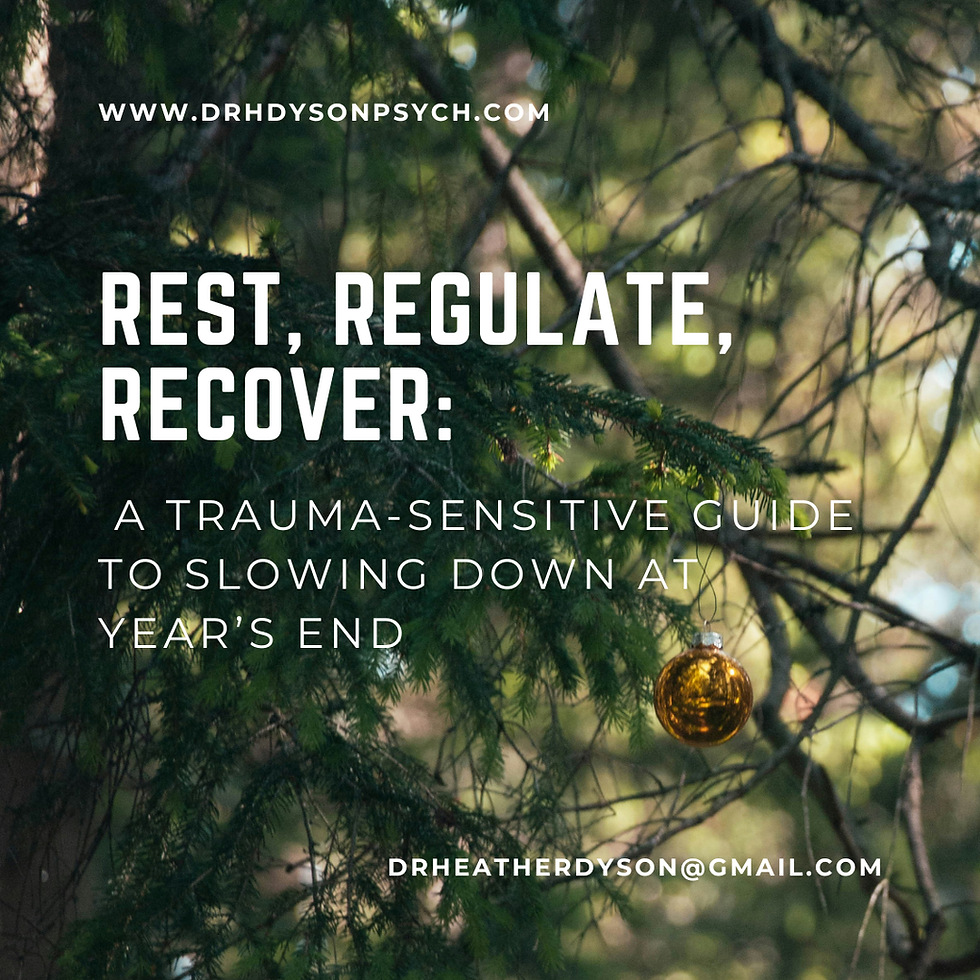What is Trauma-Focused CBT?
- Dr Heather Dyson

- Mar 8, 2021
- 3 min read
What is Trauma-Focused Cognitive Behavioural Therapy (TF-CBT)?
TF-CBT is a form of talking therapy aimed at treating people who have experience trauma and are experiences symptoms associated with the diagnosis

of post-traumatic stress disorder (PTSD) or complex-PTSD (C-PTSD).
What is trauma?
There is no one single agreed definition of trauma. Most definitions seem to agree that a traumatic event is something in which you experience actual or threatened, physical or sexual, harm or violence. These experiences can happen directly to you, or you may witness traumas second hand, or vicariously through listening repeatedly to adverse experiences (e.g., call handlers). This means that events such as domestic violence, road traffic accidents, childhood abuse, bullying, etc, can all be considered traumatic, but also environments can also be traumatic e.g. growing up experience racism or prejudice based on the colour of your skill or your religious beliefs.
What is PTSD?
PTSD can arise because of a single, or multiple incidents of trauma and result in four main groups of symptoms:
Re-experiencing memories or feelings from the trauma.
A heightened sense of threat and vigilance
Avoidance of situations, events or experiences which remind the individual of the trauma.
Changes in the individual’s beliefs about themselves, the world and others.
What does TF-CBT therapy look like?
Like all cognitive based approaches, TF-CBT initially aims to help the client to form a trusting relationship with the therapist. The components of the therapy
will always to individual to the needs of the client but may include some or all the following:
Stabilisation
The therapist may initially teach techniques to help manage the overwhelming feelings of anxiety, sadness, guilt, or anger that can be created as a result of experiencing trauma. These exercises may include grounding skills to help you remain in the here and now, as well as relaxation strategies to help alleviate the physiological arousal and tension within your body.
Work with memories
Ultimately, to overcome the distress caused by traumatic events, we know that we need to talk/think about the events. This can feel incredibly scary for many people and why it is so important that you form a strong therapeutic relationship with you therapist prior to engaging in specific trauma work. In TF-CBT, you will be asked by your thera
pist to talk through what happened, deliberately imagining the events, elaborating and contextualising the memory so that it can be fully processed (e.g. incorporating sensory information with factual memories).
Reclaiming your life
One of the fundamental symptoms of PTSD is avoidance or anything which vaguely reminds them of their trauma. The consequence of avoidance on people’s lives can be incredibly detrimental, shrinking their worlds down until they only feel safe in their homes. Following working with memories, your therapist may then help you to start to engage in previously enjoyable activities, as well as help you to go into situations which you may have been avoiding.
Is this the right trauma therapy for me?
TF-CBT is both NICE guideline and American Psychiatric (APA) Association recommended treatment for PTSD. There is a lot of strong evidence demonstrating the effectiveness of TF-CBT for the treatment of PTSD. Research has showing that it is superior in the treatment of PTSD compared to therapies which do not talk about trauma, and is as effective as other evidence-based therapies for PTSD such as eye movement desensitisation and reprocessing (EMDR).
If you have experienced trauma and would like more information about whether engaging in TF-CBT might be the right thing for you, please feel free to contact me on drheatherdyson@gmail.com.
Photo by KAL VISUALS on Unsplash




Comments